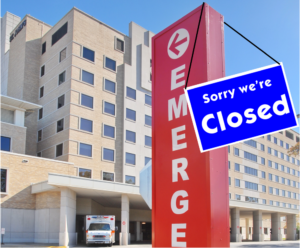Rural Public Health Ethics: Making the Case for Medicaid Expansion
By Nellie Kassebaum, MPH
Research Associate, Center for Practical Bioethics
 Why have we socially and politically failed to address the most pressing public health issues of our time? For example, why have we allowed people in rural areas to go without medical care at a significantly greater rate than people in urban areas? And why is their access to care continuing to disappear? There is no one answer, but there are new ways to think about these questions. A more pointed thing to ask that addresses both points is this: why has Medicaid expansion not happened in ten states, including my home state of Kansas, most of which is rural?
Why have we socially and politically failed to address the most pressing public health issues of our time? For example, why have we allowed people in rural areas to go without medical care at a significantly greater rate than people in urban areas? And why is their access to care continuing to disappear? There is no one answer, but there are new ways to think about these questions. A more pointed thing to ask that addresses both points is this: why has Medicaid expansion not happened in ten states, including my home state of Kansas, most of which is rural?
Rurality is an oft-discussed classification. What makes a place rural? There are any number of different definitions I could cite, but none convey the very personal, nearly ineffable definition I have for rural. I was raised on a cow-calf farm in a remote area and called anyone in a 10+ mile radius a “neighbor”.
What makes a place rural might, to you, be the absence of traffic, or a lack of restaurants and shops, or it may include a basic lack of inhabitants. All of these are fine examples, but what about a lack of healthcare?
Rural Healthcare in Kansas
Healthcare generally brings images of hospitals and doctors to mind. Let’s run with that. In rural Kansas, hospitals are suffering financially because of the state’s repeated decision to not expand Medicaid. The Kaiser Family Foundation has shown that rural hospitals in non-expansion states faced financial challenges before and during the COVID-19 pandemic, and are facing a funding cliff after the lapse of the public health emergency and related dollars. These funding issues in Kansas are longstanding. A recent mapping effort by the Center for Healthcare Quality and Payment Reform found that over half of Kansas hospitals are operating with a negative margin in patient services. The Center also found that as of May 2023, 54 Kansas hospitals are at risk of closing. These are relatively common statistics you might see cited in conversation around Medicaid expansion.
Without these care access points, rural residents are traveling longer distances, taking time off from professions that do not have standard or sufficient sick leave policies, or might delay or forgo care altogether, contributing to increasing the complexity and severity of sickness, disease and disability. When looked at in isolation, funding Medicaid expansion is expensive, but compared to the cost of hospitals closing and people getting sick(er), it may be a reasonable cost to bear.
Upstream Influences
It’s been less than three decades since public health frameworks based in public health principles were first proposed to address ethical issues in public health practice. Applying a public health ethics perspective can help explain our failure to address public health issues like Medicaid expansion.
What if we focus on what is making rural Kansans sicker, and preventing, to the extent possible, those ailments? A public health ethics framework can help us scrutinize the public health implications of not expanding Medicaid.
There are many “upstream” factors that influence our health, like access to stable and safe housing, clean air and water, and reliable transportation. Without any one of these necessities, let alone a combination of them, health can be compromised. These factors can even lead to premature death. Things are especially grim for rural residents: they are dying younger at greater rates than their urban counterparts, and have been for years. A shortage of affordable housing, nitrate runoff polluting waterways, and a significantly higher rate of motor vehicle deaths are all contributing factors to worsening health in rural America.
Health as a Collective
These problems do not exist in a vacuum; they impact entire communities across the U.S. An appropriate response to our especially high levels of preventable sickness and premature death, using a public health ethics framework, would be to address our health as a collective. One way to do that is by expanding Medicaid.
Medicaid expansion would allow two things to happen: a greater investment in upstream interventions and an infusion of cash to rural hospitals. The simple fact is that by failing to expand Medicaid, Kansas is playing a dangerous game – people can’t access hospitals because they’re closing (or reducing some patient services), and people are getting sicker because there is not systemic funding to support preventative measures.
There’s proof that some interventions are feasible, which for rural residents, means policies and programs that are affordable and being used. Communities have challenged the misconceptions that rural residents must own vehicles and exclusively travel by car (Kansas tied for the most rural transit agencies nationwide in 2019). They are finding creative ways to be physically active together (decreasing loneliness while increasing exercise). Additionally, there has been federal investment in electric energy sources, moving rural America away from fossil fuel use and its environmental impact. Not all of these interventions are equally impactful, and not all of them could be funded through Medicaid expansion. It can also take a long time for the benefits of many upstream interventions to be realized through data, making it difficult to prove efficacy to policymakers and others.
Through patience and unrelenting effort, much like the many years it took to develop public health ethics frameworks based in public health practice, maybe there will someday be enough political will, social buy-in, and shared commitment across communities to invest in our public health by expanding Medicaid.
Public health is also a social responsibility because it requires practitioners to look and think beyond the doctor’s office. Public health ethics frameworks can help me and other public health practitioners think about and respond to public health issues of the day. Given the newness of these frameworks, and the many public health issues to address in Kansas, nationwide and globally, there is work to be done, and thankfully, new ways to ask and answer ethics questions in public health.
By Nellie Kassebaum, MPH
Research Associate, Center for Practical Bioethics


